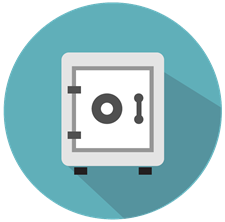OVERVIEW
Effective money management is important to achieve your financial goals. But what does money management mean? Two important parts of money management are budgeting and saving. Creating a budget shows how much money is coming in and where your money is going. Having a clear picture of where your money is going is very important to financial success. Budgeting can help drive savings, help you manage and plan to pay off your debt, build savings for a big purchase or something long-term, like retirement.
There are many ways to save money. Some ways to save can be easy and others require creativity. Saving is a very important tool in getting out of debt or building wealth. Information about creating a budget and finding ways to save are below.

BUDGETING
Budgeting is a great way to track your spending and saving. Creating a budget, or spending plan, may seem overwhelming or tough, but it can be done. Start by tracking your expenses. This will give you a good idea of what you are spending your money on, how much you are spending, and when you are spending it.
You can simplify your budget by considering your needs and wants. You also want to make sure your budget is helping you reach your financial goals. The example below shows you one way to develop a budget.
| Monthly Income: | $3,600 |
|---|---|
| Savings: | $180 |
| Rent: | $1800 |
| Utilities: | $400 |
| Groceries: | $300 |
| Eating out: | $150 |
| Auto Insurance: | $100 |
When building your budget or spending plan, use the information below to help you decide how to best spend your money (these percentages should be based on your total net income):
Get started by creating your own budget or use the resource we have created. It’s important to regularly review your spending plan. As you develop your spending plan, or budget, visit the All About Spending resource for more information.
saving
Saving is a key part of reaching financial independence and building wealth. Think of saving as giving a gift, or paying a reward, to yourself. The money you save gives you so many benefits, like having cash in an emergency. It can also give you the ability to buy big things, like a car. Remember that building up huge amounts won’t happen overnight. But it can happen if you make saving a habit, make it automatic, and stick with it over time.
TRACKING
To get started, try to track all the money you spend. A simple way to track your spending is to keep a log or diary of everything you spend. Download the Spending Plan (PDF) to create your own spending.
At the end of the month look over the log and ask yourself a few questions:
Think of one or two actions you can take today to help you reach your goals. Can you cut back in one area? Can you delay purchases to limit impulse buys? Consider picking a small action that can help you reduce your spending in one category. For example, eating out for lunch is something that you could possibly cut back on to save money. Using the money you saved, set a weekly or monthly savings target.
PLANNING
A spending plan is an evolving tool. As your goals change, update the spending plan. This will help you to gain control of your finances. Keeping track of your spending and prioritizing savings are two ways to reach your financial goals. In order to gain control of your finances try to remember EARN:
- Embrace reminders. Use reminders to keep you motivated. For example, consider setting a reminder the day before your payday to remind you to review your spending plan.
- Automate your savings. Consider setting up automatic transfers to make consistent deposits. If you set up automatic transfers, you can “set it and forget it.”
- Reduce your exposure. Leave extra money and credit cards at home to limit spending. If you, your friends and family like to shop, explore other activities with them that don’t involve spending money.
- Network. Do you have friends or family that also have savings goals? Challenge one another and check in on your goals. This may help you stay on track and meet your goals faster.
Even $5 or $10 a month can help you get into the habit of saving! If you can set aside $25 per month, you will have $300 saved up by the end of the year. Seeing your savings grow helps to motivate you to save more.
Tips for saving more
Use these tips to become a better saver.


